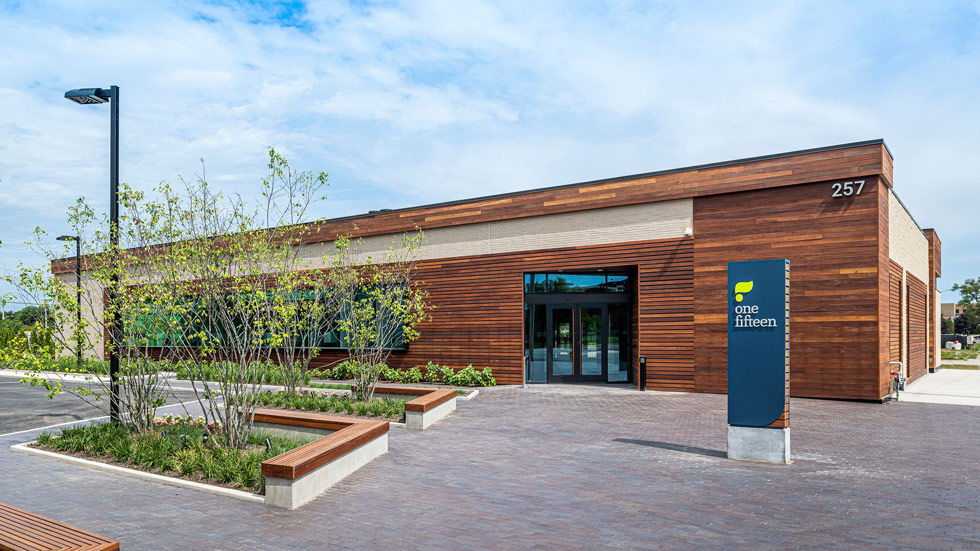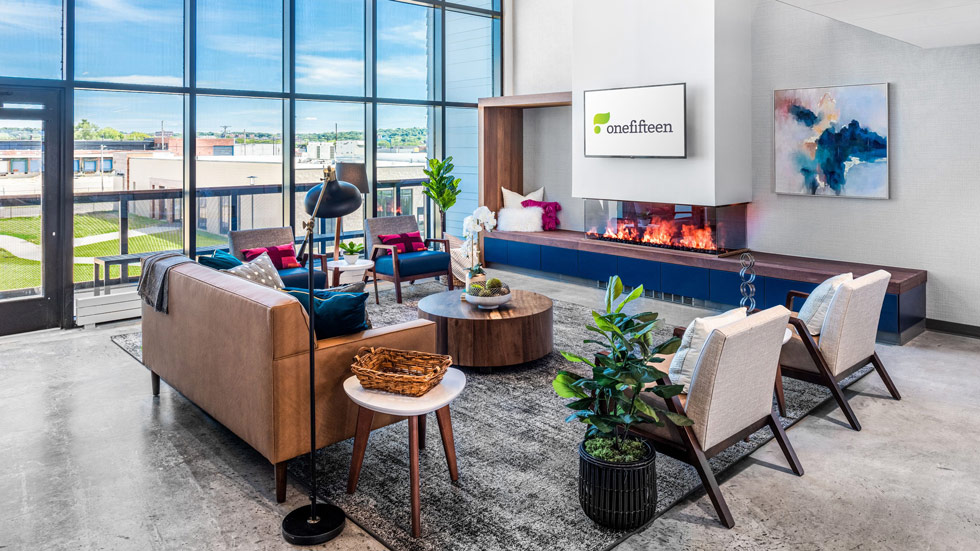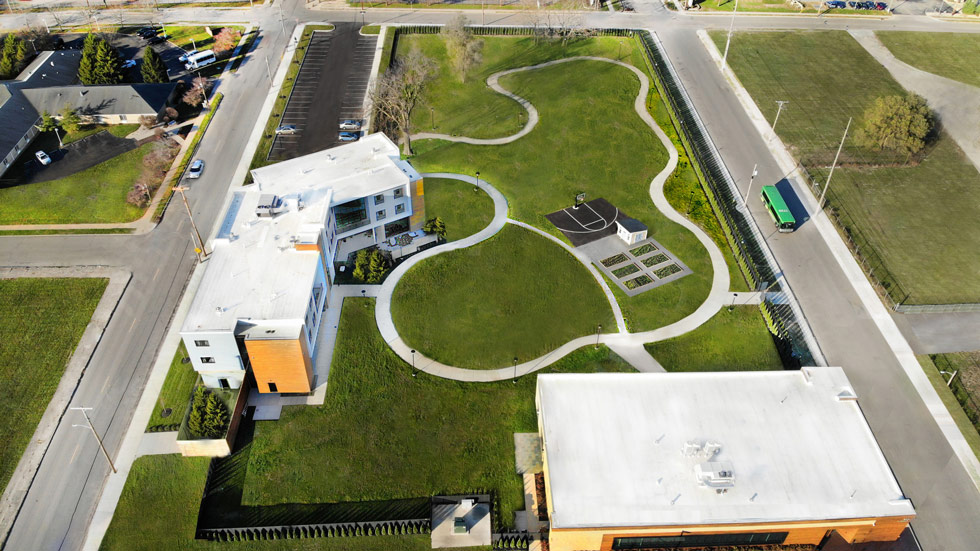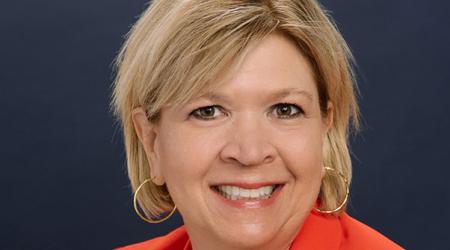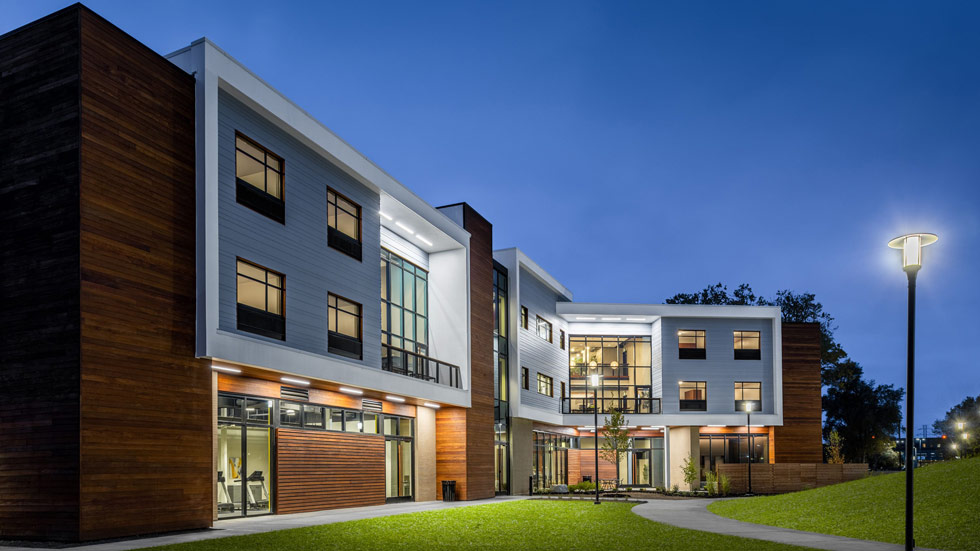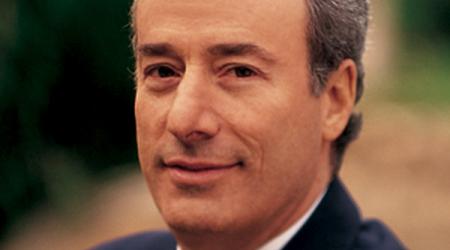Alexandria Real Estate Equities, Inc. brings a new model of opioid addiction treatment to the country’s hardest hit city.
A pioneer in the development of collaborative life science and technology campuses, Alexandria Real Estate Equities, Inc. (NYSE: ARE) is expanding its strategic mission of advancing human health by revolutionizing treatment options for those suffering from opioid addiction.
Last fall, Alexandria delivered OneFifteen Living, the residential housing component of the innovative OneFifteen opioid treatment and recovery campus in Dayton, Ohio. Alexandria led the design and development of the 4.3-acre campus in partnership with Verily, the life sciences division of Google parent company Alphabet Inc.
OneFifteen Living consists of a three-story, 26,304-square-foot residential housing building with separate living spaces for women and men, ample natural light, communal kitchens, a fitness center, a meditation room, rooms for individual and group therapy, and thoughtfully-designed outdoor space.
The design reflects OneFifteen’s overarching, holistic approach to data-driven opioid treatment by creating an entire ecosystem to support recovery. The residential component provides safe spaces for treatment and recovery while helping to facilitate family reunification—considered a critical component of the recovery journey.
Breaking the Cycle
“The recidivism rate for opioid addiction is extremely high so it became pretty clear that you can’t just detox someone without getting them to live soberly,” says Joel Marcus, Alexandria’s executive chairman and founder.
Along with the residential component, the campus consists of a crisis stabilization unit, an inpatient residential treatment center, and an outpatient clinic. These operations work in tandem to help break the cycle of addiction through learning, science, and partnership. With the opening of OneFifteen Living, it’s become clear that the project is both novel and is arriving not a moment too soon.
“People living with opioid addiction are dying from unintended overdoses at an alarming rate,” says Marti Taylor, R.N., M.S.N., president and CEO of OneFifteen. “We are on a quest to reverse the course.”
Taylor says OneFifteen creates an “ecosystem” where all levels of care are available on one campus, creating a seamless continuum for the path to recovery. “Our hope is that patients will have a greater chance for better, long-term outcomes if they receive all of their treatment in one location and are surrounded by the same care team,” she adds.
The need is dire. Opioids were involved in nearly 47,000 deaths in 2018, which is nearly six times the number of opioid-involved overdose deaths in 1999, according to the Centers for Disease Control and Prevention. Getting sustained help and support throughout the recovery process is particularly challenging and transition points increase vulnerability. “Research shows that when there is a break in care, nearly half of patients will not move to the next level of treatment,” Taylor notes. OneFifteen’s unique approach hopes to fill the gaps.
A Revolutionary Idea
The opioid epidemic has presented an unprecedented challenge to those suffering from addiction, while also placing extraordinary strains upon existing healthcare systems.
“The opioid crisis was emerging in a number of locations as an apocalyptic kind of situation—it was killing so many people because of these easy-to-access pills and nonexistent treatment options, other than 28-day programs, for example,” Marcus says. “We really wanted to do something about it.”
During the 2017 J.P. Morgan Healthcare Conference, Marcus and his team, and Andrew Conrad, CEO, chairman and founder of Verily, brainstormed ideas for how the two companies could help.
“We came up with this idea of creating a physical platform where you would have a continuum of care—data-driven, and very high quality care, from intake, to detox, to family reunification, sober living, job training and job placement,” Marcus says.
Described as an innovative, “learning health system,” OneFifteen was named for an impactful statistic: 115 people died each day in the U.S. from unintentional opioid overdoses in 2017. Together, Alexandria and Verily began assembling a team of experts to create and manage OneFifteen.
“When I received the call from Verily in 2018, I was intrigued by the vision of creating a learning health system focused on the opioid epidemic,” Taylor recalls. Dr. Rob Califf, Taylor’s longtime colleague from Duke University Hospital, introduced Taylor to the plans for creating a campus offering a full continuum of care for those experiencing substance use disorder. At that time, Taylor was the CEO of University Hospital and the Ross Heart Hospital at the Ohio State University Wexner Medical Center, managing more than 5,000 employees. “I found myself curious about this opportunity to build something literally from the ground up,” she says. Taylor joined Verily in July 2018.
The choice of Dayton for OneFifteen was strategic. In 2017, the city had more opioid-related deaths per capita than anywhere else in the country and was considered “ground zero” for the epidemic. The city and county were looking for solutions. “We knew that the need in Dayton was great,” Taylor says. “We met with community leaders who were open to the idea of being a part of a solution that could impact substance use disorder treatment at a much larger scale.”
The west Dayton location offered specific advantages. Alexandria and its partners wanted a site to be convenient and central in order to meet the maximum number of patients. The Greater Dayton Regional Transit Authority added a bus stop close to the OneFifteen Outpatient Clinic to accommodate those patients coming from outside the area.
Meanwhile, patients can take part in educational programming at nearby Sinclair Community College. The campus is also a short walk from the Montgomery County Job Center where patients can benefit from a full range of workforce development tools to help them find, obtain, and keep a good job, Taylor explains.
Building Partnerships
From the beginning, it was clear that OneFifteen’s success would be dependent on the ability to build community partnerships, Taylor says.
According to Alexandria, the project faced some initial concerns and pushback from neighborhoods in the vicinity of the OneFifteen campus. Education and outreach helped alleviate those concerns over time. “The OneFifteen team spent a lot of time with the neighbors, brought them into charrettes, and explained the project and benefits,” Marcus says.
Another challenge was getting competing health systems and multiple organizations in the area to work together on a problem that was bigger than themselves. “With Verily and Alexandria already coordinating efforts, we began to talk with the two health systems in Dayton to share our vision to create a more effective, more cost-efficient way to help people experiencing substance use disorder onto a path of recovery,” Taylor says. Premier Health and Kettering Health Network joined Alexandria and Verily as founding partners on the operational side.
The Montgomery County Alcohol, Drug & Mental Health Services Board was also supportive of the idea to create an innovative campus in Dayton and became an important funding partner for the clinical work, Taylor says. The city of Dayton and Montgomery County have also been integral to their programming. Multiple working groups regularly meet in Dayton to avoid duplication of efforts and maximize the limited resources in order to have a positive and comprehensive impact.
“These community partnerships have become key to our success. We are happy to supplement and enhance the systems in which we find ourselves,” Taylor says.
Taylor’s team regularly meets with stakeholders and leaders in the Carillon Civic Council and the Greater Edgemont Community Coalition to facilitate open conversation, address concerns, and share ideas. The president of the Carillon Civic Council sits on the OneFifteen Recovery board to promote transparency and active community participation. The mayor, city, and state have all applauded these monumental efforts.
“OneFifteen has been a bright star here. It has had a huge impact on a community that has been hit by a lot of tragedy in recent years,” says Lynne Zydowsky, chief science officer for Alexandria and president and co-founder of the Alexandria Summit. “We came in as outsiders and became a part of the Dayton community. The hospital systems have coalesced around it,” Zydowsky says.
Model for Success
The key to OneFifteen’s approach, according to Zydowsky, is that it is data-driven and evidence-based. Verily utilizes analytics to generate insights that have the potential to advance the understanding of how to treat and promote sustained recovery for those experiencing addiction.
“This approach helps monitor each patient, much like a personalized medicine approach in the sense that we have a very specific understanding of each patient and what they need, knowing why they might fall off in treatment, or why they stay on treatment. This hopefully ensures that sobriety continues,” Zydowsky says.
Rather than traditional treatment centers that detox and then release patients after 28 or 30 days without support and future treatment, OneFifteen considers recovery a journey. The campus is thoughtfully designed around a central, curved pathway connecting all of the services to guide patients on that journey. OneFifteen’s services are accessible to anyone in need of treatment, regardless of insurance status.
The OneFifteen Outpatient Clinic and its Operating Partner Samaritan Behavioral Health opened in October 2019, and the walk-in facility OneFifteen Crisis Stabilization Unit (CSU) followed in February 2020. According to Taylor, OneFifteen’s team had a goal of providing services to 1,000 individuals in OneFifteen’s first 12 months. By November 2020, they had exceeded that goal and had already treated more than 2,100 people.
Prior to opening, the only options for patients needing immediate addiction care were the local emergency rooms. “The most important benefit to the Dayton community is that 2,100 people had another choice for care that was not in existence just 18 months ago,” Taylor notes.
Having this option available also helps relieve pressure from emergency rooms in the Dayton community. The ongoing COVID-19 pandemic has resulted in overwhelmed medical facilities, limited mental and behavioral house services, and breaks in essential support networks for those grappling with addiction. Treatment facilities outside of the overburdened hospital systems are needed more than ever.
Future Plans
Alexandria says it will continue to focus its core business on life science real estate, lab space, and scientific research. More than 100 of the companies the REIT works with, such as Pfizer, Moderna, and AstraZeneca, have been involved in combating COVID-19 through vaccine development, research, and testing.
According to Marcus, the company plans to create a model similar to OneFifteen on the West Coast to address homelessness by creating a data-driven continuum of care. Alexandria and Verily also hope that OneFifteen will inspire similar projects around the country. “What we learn from the data in Dayton will be shared broadly to impact best practices in treatment medicine everywhere,” Taylor notes.
For his part, Marcus is optimistic that OneFifteen will play a meaningful role in helping to eradicate the opioid epidemic. “Our goal was to make this a model for other cities and other states. If we could spread this throughout the country, we could actually overcome this scourge,” he says.
